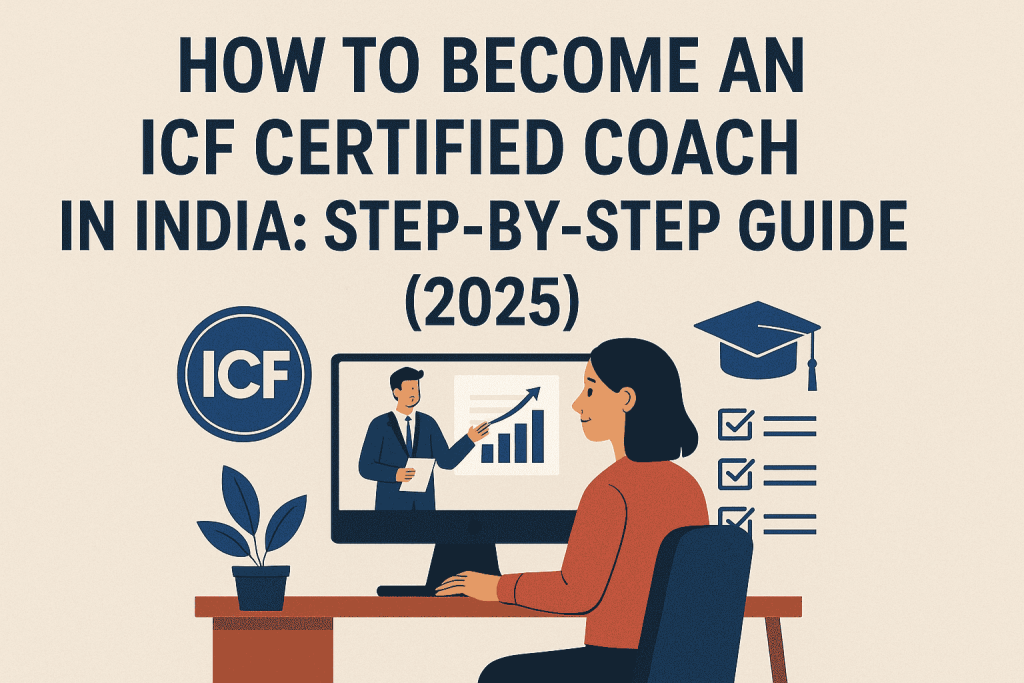
When prospective coaches research training options, cost is often the first number they look for. A quick internet search produces...

Picture yourself leading with purpose, transforming lives, and building a career that resonates with India’s dynamic spirit—all powered by a globally respected credential. In 2025, becoming an ICF Certified India coach is not just a possibility; it’s a golden opportunity amid the country’s booming corporate and startup sectors. With giants like TCS, Infosys, and innovative startups in Bengaluru and Hyderabad seeking skilled coaches, the demand has never been higher. The International Coach Federation (ICF) certification offers you credibility, flexibility, and a clear path to success.
This comprehensive guide is crafted for aspiring coaches across India, whether you’re a corporate leader, an HR professional, or someone seeking a meaningful career shift. We’ll dive into the step-by-step process, explore the wealth of opportunities, and highlight why choosing to become an ICF Certified India coach is a decision that can shape your future. Let’s get started on this transformative journey!
Discover your coaching potential on our homepage or reach out to us for tailored support.
The International Coach Federation (ICF) stands as the global benchmark for coaching excellence, boasting a network of over 40,000 professionals worldwide. In India, where the coaching industry is poised to grow at a robust 12% annually in 2025, ICF certification is a powerful validation of your skills. It offers three progressive levels—Associate Certified Coach (ACC), Professional Certified Coach (PCC), and Master Certified Coach (MCC)—each demanding increasing levels of training, experience, and mastery.
For Indian professionals, this certification is more than a title; it’s a gateway to opportunities in corporate settings, entrepreneurial ventures, and private practice. Programs like Erickson Coaching International’s “The Art & Science of Coaching” (TASC), delivered in an 8-day in-person format across cities like Mumbai, Delhi, and Bengaluru, are perfectly aligned with ICF standards while addressing local cultural and professional nuances.
Opting to become an ICF Certified India coach unlocks a world of advantages that resonate with India’s evolving landscape:
In a nation where tradition blends seamlessly with innovation, ICF certification positions you as a pioneer in a field that’s reshaping leadership and personal development. It’s an investment in yourself and a contribution to India’s future.
The journey begins with introspection. Why do you aspire to become an ICF Certified India coach? Are you a manager at Infosys eager to inspire your team? An HR leader aiming to foster a coaching culture? Or perhaps a career changer seeking a purpose-driven path? No prior coaching experience is necessary, but a genuine passion for growth and a readiness to commit are crucial.
India’s fast-paced professional environment, where individuals often juggle multiple responsibilities, makes self-assessment vital. Take time to identify your niche—be it leadership coaching, career transitions, or personal development—and confirm your willingness to invest the required time and energy.
The cornerstone of ICF certification is high-quality training. Erickson’s TASC program, conducted in-person across India (Mumbai, Delhi, Bengaluru), stands out as a premier option. This 8-day intensive course encompasses:
While global online programs exist, TASC’s local delivery and strong alumni network provide a distinct advantage. In 2025, training costs in India are likely to range from INR 1.5 lakh to INR 3 lakh. Explore available schedules and compare options by visiting https://www.erickson.co.in/ or checking the ICF’s list of accredited providers at coachfederation.org.
ICF stipulates specific training hour requirements: 60 hours for ACC, 125 for PCC, and 200 for MCC. TASC’s 8-day program, totaling approximately 60 hours, satisfies the ACC baseline, with additional modules available for higher certifications. These hours comprise:
The condensed 8-day format is ideal for India’s busy professionals, though planning for subsequent training is necessary for PCC or MCC levels. Maintain meticulous records, as ICF conducts thorough audits.
Experience is the bridge between theory and expertise. For ACC, you need 100 hours of client coaching with a minimum of 8 clients. PCC requires 500 hours, while MCC demands 2,500. In India, begin by coaching friends, family, or colleagues to gain confidence.
Many TASC alumni contribute to local communities through pro bono sessions, accumulating experience while making a social impact. Collaborate with NGOs or corporate CSR initiatives for pilot projects. Document each session—duration, feedback, and outcomes—to bolster your ICF application.
The certification journey culminates in a structured process with three main components:
Erickson India’s alumni network offers valuable support, including mock evaluations to prepare you. Schedule your assessment through coachfederation.org, ensuring you meet ICF’s rigorous standards.
After certification, maintain your ICF Certified India status by completing 40 continuing coach education units (CCEUs) every three years and paying renewal fees of $50-$150 USD. Engage with the Indian ICF chapter for workshops, networking, and advanced training opportunities. Many alumni pursue PCC or MCC, tapping into India’s expanding coaching market.
India’s corporate powerhouses—TCS, Wipro, and HCL—are embedding coaching into leadership development. As an ICF Certified India coach, you can step into roles like internal coach or consultant, commanding salaries of INR 1-2 lakh monthly. The post-pandemic emphasis on employee well-being has fueled this trend.
Bengaluru, dubbed India’s Silicon Valley, is a hub for startups hungry for coaches to enhance team morale and innovation. Certified coaches can offer freelance services at INR 5,000-10,000 per session, with the potential to grow into a thriving practice.
Establish your own coaching business, focusing on niches like career transitions or stress management. In 2025, platforms like CoachHub and local directories facilitate this, with earnings potential exceeding INR 1.5 lakh monthly.
Support NGOs or rural entrepreneurs, addressing India’s diverse challenges. Pro bono work builds experience and paves the way for paid engagements.
Your ICF credential enables online coaching for international clients, extending your reach beyond India’s borders.
In India’s competitive coaching landscape, ICF certification distinguishes you as a professional of excellence. TASC’s alignment with ICF ensures you meet these elevated standards from the outset.
As the industry expands, certified coaches experience a 20-30% income boost within two years. The ability to work part-time or full-time caters to India’s varied professional needs.
Coaching others fosters your own development, enhancing empathy, resilience, and leadership—skills that enrich every facet of life.
With India’s youth and professionals seeking guidance, becoming an ICF Certified India coach allows you to empower the next generation, aligning with the nation’s vision for a skilled workforce.
The 8-day TASC format is designed for busy schedules, with flexible follow-up options for higher levels. Strategic planning ensures a balance between work and training.
Training costs can be offset with employer sponsorships or installment plans from Erickson. The substantial return on investment, given the earning potential, makes it a worthwhile endeavor.
Some clients may favor directive approaches. TASC’s solution-focused methodology, emphasizing collaboration, aligns with Indian values, helping you overcome this hurdle.
This step‑by‑step guide explains how to set your intentions, accumulate training hours, log coaching experience and navigate the credentialing process. Once you’ve mapped out the journey, the next crucial decision is choosing an ICF‑accredited program that fits your timeline, budget and learning style. Factors to weigh include whether the provider’s accreditation is current, how the curriculum integrates ICF core competencies, the length and format of training (e.g., an intensive in‑person course versus modular online learning), and the availability of mentor coaching. Quality programs offer structured practice sessions, robust feedback and access to an alumni network that supports you as you build coaching hours and prepare for exams. To streamline your decision‑making, consult Erickson’s detailed 2026 comparison guide for India. It presents a clear overview of leading ICF programs, comparing accreditation levels, training hours, mentoring approaches and scheduling flexibility. Reviewing these insights will help you choose the training pathway that best supports your goal of becoming an ICF‑certified coach.
Becoming an ICF Certified India coach in 2025 is a gateway to leadership, impact, and success. With Erickson’s TASC program and this detailed guide, you’re well-equipped to achieve ACC and beyond. The opportunities are abundant, the rewards significant, and the moment is ripe. Take action today—visit https://www.erickson.co.in/ to enroll and start shaping your future.
Explore more on our homepage or contact us to begin your journey.

When prospective coaches research training options, cost is often the first number they look for. A quick internet search produces...

Effective strategic planning and stakeholder management are essential skills for leaders in a rapidly changing business environment. Strategic planning provides...

Change Management & Digital Transformation: Build Adaptive Leaders with Erickson Coaching Rapid technological advances, shifting customer expectations and global disruption...

Discover how Erickson’s solution‑focused coaching delivers up to 788 % ROI and drives operational excellence by improving strategic thinking, communication and...

The coaching profession has moved from the margins to the mainstream. Recent global studies show that the number of professional...

India’s economy has transformed dramatically over the last decade, and the demand for top business coach India services has grown...

When searching for a certified life coach program price, it’s natural to start by comparing tuition fees. Aspiring coaches want...

Neuro-Linguistic Programming (NLP) is experiencing a resurgence in India. Social media, workshops and high-energy seminars promise instant breakthroughs by rewiring...

Many professionals pursue the title of Certified Organizational Development Coach with the expectation that a credential alone will open corporate...